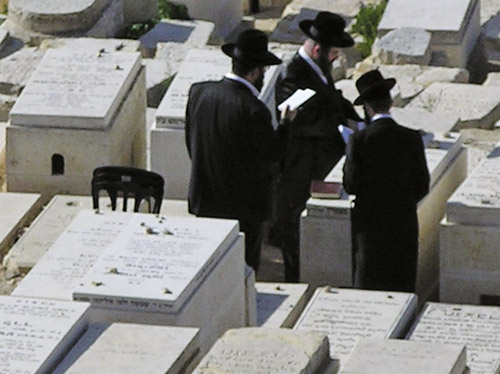
A couple contacted our crisis hotline: They had experienced the tragic loss of someone close to them and would be attending the funeral services and burial. They have teen-aged children and younger children and sought out our guidance about whether or not to expose their children to the funeral, or to shelter them from these practices involving death and mourning.
A parent’s first consideration in grappling with this question might begin with the Jewish tradition. The level of closeness the child had with the deceased may influence the parent’s decision about whether their child belongs at the funeral. Parents have a sacred obligation to guide and train their children in the performance of Torah commandments. This is known as the mitzvah of chinuch. Once a child reaches the age of mitzvos, he or she takes on their own obligation to engage in fulfilling those commandments. There are varying views among our rabbinic sages as to whether and how a parent might guide a younger child in those practices involving death and mourning. It is important for each couple to discuss this matter with their rabbinic authority. Similarly, in some parts of the worldwide Jewish community, there is a custom that the family does not go to the cemetery for the funeral, and one’s rabbi must be consulted on this as well.
From a mental health perspective, it is useful to differentiate between the loss of a family member, the loss of a family friend or neighbor and the loss of a friend or classmate of one’s child. The level of closeness that child had with the deceased may influence the parent’s decision about whether their child belongs at the funeral. Attending a levaya (funeral) service, hearing hespedim (eulogies), observing a burial and visiting a shiva-house are all intense experiences. A parent’s consideration for a child who has never encountered those events, or is fearful about attending, should be based in part on their knowledge of the child’s maturity, their relationship with the deceased and their general wellbeing. Generally, children five and below would not be encouraged to attend these services and rituals. They typically lack the intellectual sophistication to make sense of the experience and instead can be flooded with the sights, the sounds and the gravity of the scene. Children that young typically have little understanding of death and its finality. This can result in tears, fears, shock, confusion and agitation. Whatever might be gained in theory, through trying to educate the child in Jewish mourning practices can be overshadowed by the child’s emotional distress. A parent also should be discerning in how spiritual concepts about death and mourning are presented to children. Some concepts can be inspiring, yet some can be confusing to a young mind; some can be frightening as well.
Generally, children of age six and above can be prepared for what they will see and hear, and can understand at some level what has happened and why the funeral is conducted in that manner. If the child resists attending, then we would not insist that they go—in that, there may not be a formal obligation of chinuch therein—and we would not force a child to experience a scene which could be frightening to them. A possible exception would be in situations when the deceased was a family member, i.e., a parent, sibling or very close relative. Children over age six—generally speaking—who have had an ongoing meaningful relationship with the deceased family member often will regret in the future that they did not “say goodbye,” or did not pay that final respect to the loved one. In that situation, a parent might prompt the child to attend and frame the experience as an act of respect and of parting with the relative. Generally, if a child below age eight or nine still resists the experience or is markedly fearful, we would not coerce him or her to be there.
In any situation where a parent opts to bring a child to the funeral or services, there are three important steps.
First, a child must be prepped or pre-briefed about what will take place, what they are likely to see and hear, i.e., crying, emotional speeches, tearing of garments, the aron, the burial and the shura (the double line forming a pathway through which the mourners pass). Secondly, younger children should be accompanied by a safe and familiar adult who will stand near them and observe the child’s reactions. Often, a child will stand a bit away from the actual burial. If the adult is concerned that the experience is overwhelming the child or if the child wants to leave, they can accompany them away. Third, a child needs to process their experience after the fact.
A parent or close relative, or when appropriate a teacher or other familiar caring person, should encourage the child to express feelings, physical reactions, thoughts and confusion and they should be listened to supportively—not critically—and allowed their reactions. The adult should be soothing, validating and reassuring and attempt to answer factual questions with uncomplicated explanations. It is, generally, not useful to try answering “Why?” questions about suffering, tragedy and death; it can be validating to commend the questioning child about their sensitivity and caring—rather than attempting a logical explanation about why people suffer in this life. The child should be checked in on in the days that follow and be given time and attention to express lingering fears, sadness or other reactions.
May Hashem bring comfort to all of His children.
Rabbi Dr. Dovid Fox is a forensic and clinical psychologist, and director of Chai Lifeline Crisis Services. To contact Chai Lifeline’s 24-hour crisis helpline, call 855-3-CRISIS or email crisis@chailifeline.org. Learn more at www.chailifeline.org/crisis.









